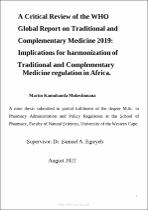| dc.contributor.advisor | Egieyeh, Samuel A | |
| dc.contributor.author | Mukeshimana, Martin Kamuhanda | |
| dc.date.accessioned | 2024-03-19T13:12:21Z | |
| dc.date.available | 2024-03-19T13:12:21Z | |
| dc.date.issued | 2022 | |
| dc.identifier.uri | http://hdl.handle.net/11394/10682 | |
| dc.description | >Magister Scientiae - MSc | en_US |
| dc.description.abstract | A broad range of Traditional and Complementary Medicine (TCM) practices and products is available and accessible to the population in many countries in Africa, and worldwide. Therefore, an effective and harmonized medicines regulatory system is required for TCM. The World Health Organization (WHO, 2019) global report on TCM highlighted the progress that was globally achieved in the regulation of TCM by countries that have implemented and adopted TCM services over the past two decades. Within the African continent, the African Medicines Regulatory Harmonization (AMRH) Initiative aims to strengthen regulatory capacity, encourage harmonization of regulatory requirements, and expedite access to good quality, safe, and effective medicines. However, several studies have shown a limited capacity to regulate TCM and medical products in general, hence the need to assess. Aim: This study assessed the status of TCM regulation in some African countries and deduced how the current status can advance the harmonization efforts in Africa. Method: A desk research on the status of African countries in adopting and implementing the WHO, 2019 TCM indicators was conducted, and a qualitative descriptive approach was used to analyze the data. Results: A total of 28 African countries responded to the (WHO, 2019) global report. The results showed remarkable progress on some WHO indicators such as the National policy and the National Office for TCM. For the primary WHO indicators that are fundamental to achieving harmonization such as the regulation and monitoring of the manufacturing of herbal medicine, results showed less than 50% of implementation by African countries. | en_US |
| dc.language.iso | en | en_US |
| dc.publisher | University of the Western Cape | en_US |
| dc.subject | Traditional and Complementary Medicines | en_US |
| dc.subject | WHO African Region | en_US |
| dc.subject | Africa | en_US |
| dc.subject | African Medicines Regulatory Harmonization (AMRH) | en_US |
| dc.subject | University of the Western Cape | en_US |
| dc.title | A critical review of the who global report on traditional and complementary medicine 2019: implications for harmonization of traditional and complementary medicine regulation in Africa. | en_US |
| dc.type | Thesis | en_US |
| dc.rights.holder | University of the Western Cape | en_US |

